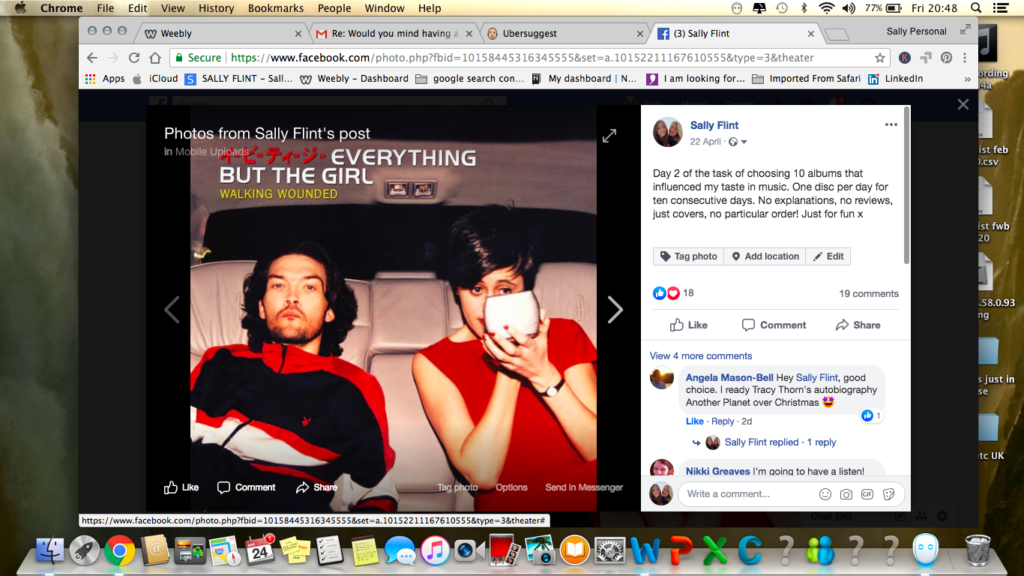What Does Cool Mean?

One of the dangers of having time on our hands is over thinking things. This week I was invited by a friend to join in with one of those facebook challenges that are going round where you are asked to show your top ten album covers. My choices are very cheesy and a part of me didn’t want to take part. I would be exposed as a very ‘uncool’ music lover. Another part of me though, almost wanted to exaggerate the ‘cheesy’ aspect and present it as my own kind of ‘coolness’. It got me thinking about what it is to be cool and why it either matters or doesn’t matter to be cool.
How to be Cool
The very word ‘cool’ of course, is no longer even ‘on trend’ or ‘cool’. It would be, of course, ridiculously ‘uncool’ for me to use ‘cool’ replacements, such as ‘sic’. (It isn’t cool to try to be a teenager at 51!) When I was teaching, the term ‘cool’ was used to categorize a particular group of students. Rather like there were the ‘jocks’ and the ‘nerds’, there was ‘the cool kids’. My understanding is that this was the group that the majority aspired to be one of. I think the cool kids were trendy, were a little bit rebellious and most importantly were popular. Being ‘popular’ made them cool, and being ‘cool’ made them ‘popular’. It seemed image was a large part of being both cool and popular and how you presented yourself mattered. As such, it was a fairly shallow measure, but whilst it lacked depth and substance it was largely aspired to.
So that takes me to the question of whether being cool is a pathway to being accepted in a particular cohort? Or perhaps it can be used as a wider term for being generally accepted into those parts of society you desire to be in. We might want to be cool to be accepted, even if it goes against the behavioural, social and cultural values we have. If so then isn’t desiring to be cool a bit pitiable, as surely being strong enough to stand out from the crowd is a more worthy quality than being cool. Maybe part of our brain views ‘being cool’ as negative. It is like smoking or drinking alcohol, we might want it, but we know it is bad for us. Maybe it is just the ‘wannabes that have to try to be cool; the really cool people just somehow are! If that was the case though, then why would so many ‘allegedly cool’ people end up with tremendous mental health issues. Maybe aspiring to coolness is hugely detrimental to our mental health.
It seems that being cool is as ‘long as a piece of string’ and as ‘changeable as the wind’ and we need to decide whether to follow trends or buck them. Particularly for young people this can be hard as we are still figuring out who we are. What is popular and cool one week is naff and out of date the next. For example, when I had a ten and an eleven year old it was very cool to love One Direction, until suddenly it wasn’t. If there is one thing that is constant about being cool is that what is cool isn’t constant.
Before I started this post I asked my own kids if I should write about being cool and they said it was too big a topic; I’d never figure out what i wanted to say and I’d end up rambling. They were right, I am not getting anywhere fast. When living in the moment to really strive for coolness there is a need to be prepared to change to fit in. Historical perspective and ‘age’ changes this perspective and we can explore coolness as a tool to reflect on who we have become and what our influences were.

What's Cooler than Being Cool?
It is possibly true to say that ‘coolness’ matters more when we are young and we are less self-assured. As my hesitancy over sharing my uncool music shows, perhaps it doesn’t ever completely go away. What is actually cool is to not give a stuff about ‘what is cool’, however, whilst we co-exist with others, this isn’t ever going to completely happen. It links to an awareness of a desire to be accepted, juxtaposed against what we are prepared to do in order for that acceptance. It’s tied up with our very sense of self worth.
Being cool links to a shared understanding of values that ascertain popularity, acceptance and status. They are defined within groups in a particular place and time in history. With this shared history it is possible to explore ‘being cool’ together. Exploring what was ‘cool’ is fun and doesn’t need to get ‘heavy’. As I say, I over think things.. Maybe I’m harbouring a secret wish that exploring ‘coolness’ in this way, is indeed just a little bit cool in itself! Is my music ever going to be cool though? I doubt it.